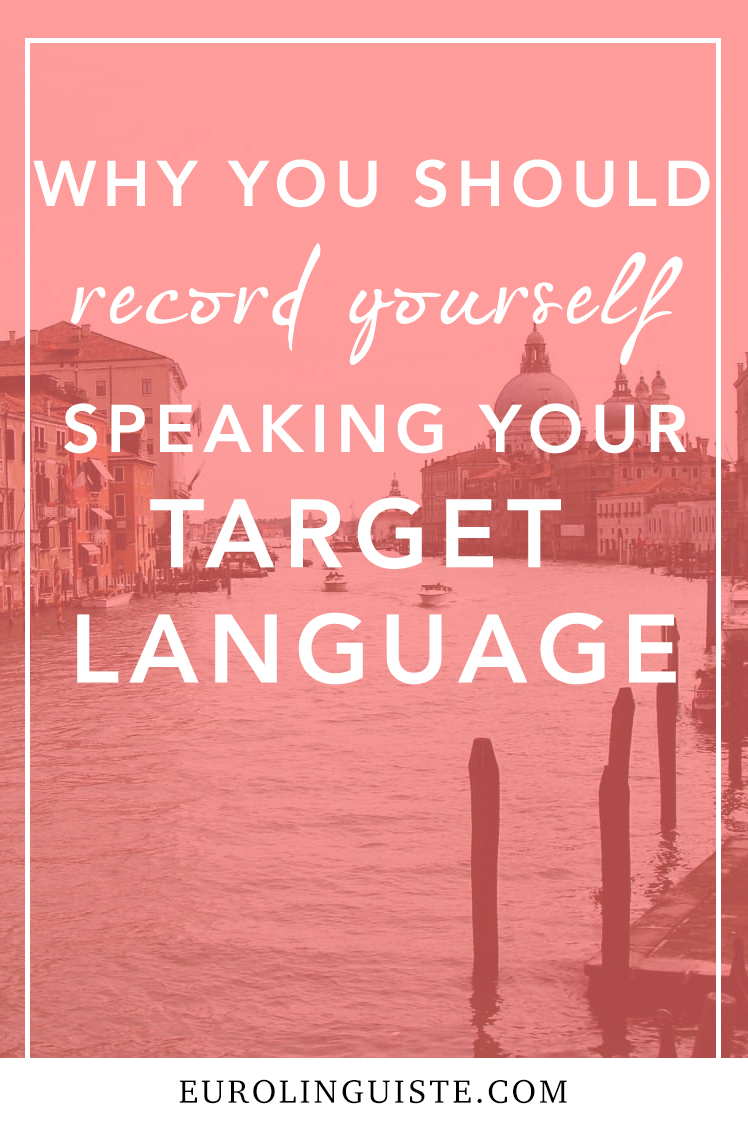Why You Should Record Yourself Speaking Your Target Language

My name is Shannon Kennedy and I'm the language lover,…
When we first make the transition from a ‘beginning’ language learner to an ‘intermediate’ or ‘advanced’ language learner, maintaining our learning curve can present a real challenge. We tend to hit a plateau, feeling like we’re making little, if any, progress.
But the truth is, you are making progress. The steps forward are just a bit smaller, and therefore, harder to notice.
That, and when we start out, there is just so much of the language that is new to us that any step is a step forward. At the intermediate stage, however, it can be difficult to figure out what to do next.
And when you’re learning on your own, you can feel a bit lost without having someone or something there to tell you what to do next to get better.
How do you find the direction you need to continue improving?
One of the easiest ways to get a bit of direction whenever you feel as though learning a language is a struggle is to get with a good language teacher. A good instructor can offer you that feedback or direction you need.
But what if you’re not able to take lessons, for whatever reason?
Record Yourself Speaking Your Target Language
If you aren’t able to take lessons, there’s something that you can do to find that direction you need. Record yourself speaking your target language.
You can do this when you’re chatting with native speakers, when you’re working through a lesson and speaking aloud, reading a chapter of a book out loud or even record yourself improvising or reading a monologue that you’ve written.
Why do this?
Because in listening back to that recording (or in watching it if you’ve made a video recording), you will pick up on things you weren’t aware of – both good and bad – in real time.
Video VS Audio Recordings
While you might argue that you really only need to record the audio to review where you’re at with your speaking, I’d counter it why I think you’ll get more out of recording yourself on video.
With video you can also evaluate your body language. Do you look comfortable speaking the language? Perhaps you made a face at a certain point that indicated you weren’t sure of something, so you can go back and review whatever it was that made you hesitate. Do you look engaged in the conversation or monologue in a way that’s culturally appropriate to the language you’re learning? Remember, that communicating in a language isn’t just about words and grammar!
And what about the movement of your mouth? Have you ever noticed that people who speak different languages sometimes move their mouths differently when they speak? That’s because the way you position your lips and tongue determines the sounds your mouth produces. Some languages require the mouth to form certain shapes in order to properly pronounce different sounds. Watch the way your mouth moves when you speak your target language and then watch the way a native speaker’s mouth moves. How do they compare? Perhaps that French ‘u’ sound you’ve been struggling with might be remedied by completing this exercise.
Make the Good Better and the Bad… Well, Less Bad
When it comes to improving at language learning, there are two things you can do. You can make the good great and the bad better. It’s all about whether you want to refine the things you can already do or work on something you can’t yet do.
Recording yourself gives you the reference point for both.
Learn from the Bad
Start recording yourself as you practice speaking your target language or when you’re engaged in conversations with native speakers and other learners. As I mentioned before, audio is great, but video is even better.
The next step is the hardest one.
Watch it.
For some, watching a video of themselves or listening to themselves speaking can be an awkward (or even frustrating) experience. I, for one, don’t like to watch videos of myself or even listen to myself speak.
So if it helps you feel better, I’ll share a video of one of the first times I ever spoke Mandarin Chinese. Just thinking about it makes my cheeks burn! Tones? What are tones?
But how am I going to improve my ability in a language if I don’t watch the videos or listen to the recordings of myself speaking?
If I don’t take the time to evaluate what I’m doing and where I’m at, there are likely things that I’ll miss. Perhaps I believe I’m more dynamic when I speak or that I’m pronouncing things better than I really am. Perhaps I don’t realize that I’m constantly butchering that one grammar rule or using the wrong tense to describe something that happened in the past.
The only way I’m really going to catch all of those little things that can truly amp up my speaking ability (if I work on them, of course) is by analyzing past performances in the language.
I need to look at the ‘bad’ things that I’m doing, the mistakes that I’m making, and iron them out.
But it’s not just ‘your bad’ that you can learn from.
You can also learn from the mistakes native speakers of your target language make when speaking your native language. By paying attention to the mistakes native speakers make, you’ll pick up on patterns. And those patterns often translate into hints about your target language. I could talk about this more, but Gabby Wallace already did an amazing job of it over on Fluent in 3 Months.
Whatever it is and whatever the origin is (you or someone else), learn from it.
Learn from the Good
While watching the videos or listening to the recordings of you speaking your target language, don’t just pay attention to the things that you are doing poorly. Trust me this is actually kind of hard. But also keep track of the things that you’re doing well.
And then keep doing them.
These are your go-to’s and starting points for future chats in your target language and they are a launch pad for you build upon.
You can also learn from the good of other speakers. Listen to recordings and watch videos of native speakers of your target language. Listen and watch for things that may seem unfamiliar or surprising to you.
Then learn how to use those things yourself. If it’s a grammar rule you’re not getting (‘why did she use that tense there?’), sit down and study it. If it’s vocabulary you didn’t understand, try to write down the words the best you can based on what you hear and stick them in Google (sometimes they fix the spelling for you and then you not only learn how to spell the word but what it means!).
Listen to native speakers talk about things that are relevant to you. If you have an exchange partner, try to get them to talk about your interests (they shouldn’t be hard if you have a fair exchange set up). If you don’t, try to find videos on YouTube or podcast recordings that cover subjects that interest you in your target language.
Take Action
Remember – filming or recording yourself speaking your target language isn’t enough.
You need to take the time to watch the video or listen to the recording and evaluate what you’re doing well and what you’re not doing so well.
This is why I constantly talk about keeping a language learning journal. You can take notes on your observations while listening/watching yourself speak and then use those notes as a reference point for your future studies. Whenever you feel uncertain about the next step, you can always pop open your learning journal and look at your notes to get some direction for your learning.
You can learn a lot from recording yourself, whether you’re learning from the good or the bad. It’s up to you to use what you gain from the experience of going through this exercise to improve as a speaker and learner of your language. Collect what you can from these experiences and put it to work for you.
What about you?
What are some techniques you use once you hit that intermediate/advanced stage to avoid hitting a plateau?
Do you ever record yourself speaking? If you do, do you actually go back and listen to/watch the recording or do you have a hard time getting around to that step?
I’d love to hear from you in the comments below!
My name is Shannon Kennedy and I'm the language lover, traveler, and foodie behind Eurolinguiste. I'm also the Head Coach of the Fluent in 3 Months Bootcamp, co-founder of Women in Language, and former Resident Polyglot at Drops.



